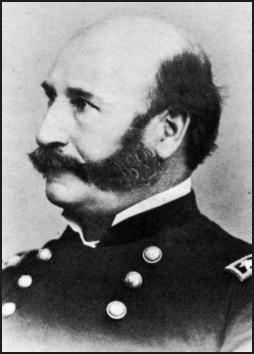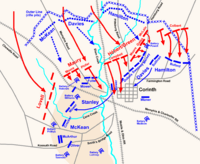Augustus Louis Chetlain facts for kids
Quick facts for kids
Augustus Louis Chetlain
|
|
|---|---|

Augustus Louis Chetlain
|
|
| Born | December 26, 1824 St. Louis, Missouri |
| Died | March 15, 1914 (aged 89) Chicago, Illinois |
| Place of burial |
Greenwood Cemetery, Galena, Illinois
|
| Allegiance | United States of America Union |
| Service/ |
United States Army Union Army |
| Years of service | 1861–1866 |
| Rank | |
| Commands held | 12th Illinois Infantry |
| Battles/wars | American Civil War |
Augustus Louis Chetlain (born December 26, 1824 – died March 15, 1914) was an important soldier in the United States Army. He was known for being the very first person in Illinois to volunteer for the American Civil War when it started. He later became a Union Army general, which is a high-ranking military leader.
Contents
Early Life and Career
Augustus Chetlain was born in St. Louis, Missouri. His parents were from Switzerland. They moved to the United States after living in Canada for a short time. When Augustus was a baby, his family moved to Galena, Illinois.
He went to school in Galena. After finishing school, he worked as a clerk. In 1852, he started his own business. By 1859, he had become quite rich. He sold his business in the U.S. and traveled around Europe. When he came back, Chetlain helped with the 1860 presidential campaign.
Civil War Service
When the American Civil War began in 1861, Augustus Chetlain decided to support the Union. People said he was the first person in Illinois to volunteer for the war.
On April 16, he attended a meeting in Galena. The goal was to create a group of volunteer soldiers. Chetlain and Ulysses S. Grant were key in forming this group. Grant suggested that Chetlain should be chosen as the group's captain.
In Springfield, Illinois, in late April, the 12th Illinois Infantry was formed. Chetlain's company joined this regiment. On May 2, he officially joined the Union Army as a captain of the 12th Illinois. The very next day, he was chosen to be the regiment's lieutenant colonel.
Early Battles
Soon after, the 12th Illinois regiment was sent to Cairo, Illinois. In September, Chetlain's group helped Grant's forces capture Paducah, Kentucky. Chetlain was then put in charge of Smithland, Kentucky. There, he built defenses to protect a part of the Cumberland River.
In January 1862, he rejoined his regiment. He led them during a trip up the Tennessee River. They helped capture Fort Henry on February 6. He also led his soldiers during the Battle of Fort Donelson from February 12 to 16.

On April 6, 1862, Chetlain bravely led his regiment during the Battle of Shiloh. About a quarter of his men were hurt or killed. Chetlain himself was wounded, with serious bruises on his face and chest. On April 27, he was promoted to colonel because of his bravery at Fort Donelson.
In May, his group took part in the Siege of Corinth. They also fought in the battle there on October 3 and 4. Chetlain was highly praised again for his excellent performance.
Training Black Soldiers
After the battle, Chetlain was put in charge of Corinth, Mississippi. There, he started a very important job: organizing and training black soldiers for the Union Army. This work lasted until May 1863. On December 18, he was promoted to the rank of brigadier general.
Grant advised that Chetlain should raise black troops in Tennessee and Kentucky. His main office was in Memphis, Tennessee. By October 1864, he had trained about 17,000 men. These soldiers were "well armed, drilled, and disciplined." This means they were ready for battle.
End of War Service
On June 18, 1865, Chetlain was given the honorary rank of major general. From 1865 to 1866, he was in command in Memphis and then in Talladega, Alabama. On January 26, 1866, Chetlain left the Union Army.
People described his time in the war like this:
Gen. Chetlain throughout his varied army career had military ardor, and a love for the profession of arms. He proved himself a brave commander in action, a successful organizer, an excellent disciplinarian and tactician, and possessed a high order of administrative ability.
This means he was a brave leader, good at organizing, and very skilled at managing things.
Later Life
After the Civil War, Chetlain worked for the government. From 1867 to 1869, he was an assessor for Internal Revenue in Utah. From 1869 to 1872, he was a U.S. consul in Brussels, which means he represented the U.S. government there.
In 1872, he started a banking business in Chicago. He also became a stock broker. He was the president of the Home National Bank and helped start the Industrial Bank of Chicago. He was also a director of the Chicago Stock Exchange and a member of the Board of Education.
Augustus Chetlain was very active in helping others. He was a key member of groups like the Military Order of the Loyal Legion and the Grand Army of the Republic for many years.
In 1893, he wrote a book called Recollections of Seventy Years. He passed away on March 15, 1914, in Chicago. He was buried in Greenwood Cemetery in Galena.

